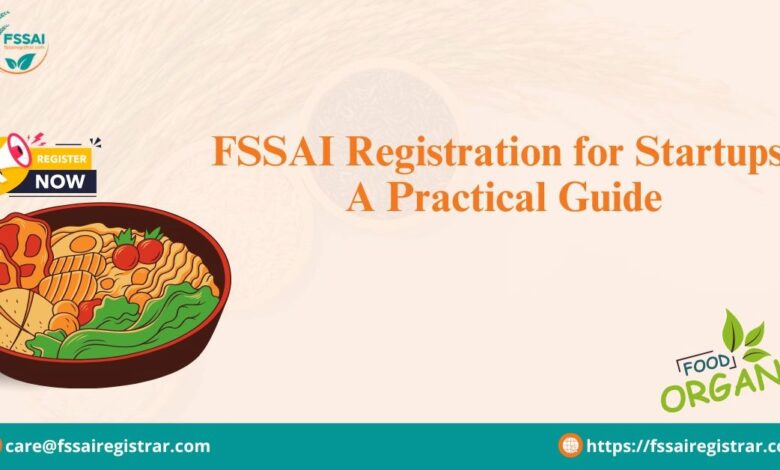FSSAI Registration for Startups: A Practical Guide

Introduction
In the dynamic and competitive landscape of the food industry, startups are increasingly emerging with innovative products and unique business models. However, navigating the regulatory environment is crucial for their success. One of the key regulatory requirements for food businesses in India is the FSSAI (Food Safety and Standards Authority of India) registration. This practical guide aims to help startups understand the importance of FSSAI registration, the steps involved in obtaining it, and the benefits it offers.
Understanding FSSAI and Its Importance
The Food Safety and Standards Authority of India (FSSAI) is a statutory body established under the Ministry of Health & Family Welfare, Government of India. It is responsible for ensuring that food products are safe for consumption and meet the quality standards set by the government. FSSAI registration is mandatory for all food-related businesses, including manufacturers, processors, distributors, and sellers. For startups, obtaining FSSAI registration is a legal obligation and a mark of credibility and trust.
Why FSSAI Registration is Crucial for Startups
For startups, credibility is essential for building customer trust and expanding their market presence. FSSAI registration acts as an assurance to consumers that the food products they are consuming are safe and of high quality. It also ensures compliance with food safety regulations, which can prevent legal issues and penalties. Furthermore, having an FSSAI registration can enhance the startup’s reputation, making it easier to attract investors and partners.
Types of FSSAI Registrations
FSSAI offers three types of registrations/licenses based on the scale and nature of the food business:
Basic Registration:
This is for small food businesses with an annual turnover of up to ₹12 lakhs.
State License:
Medium-sized food businesses with an annual turnover between ₹12 lakhs and ₹20 crores require a state license.
Central License:
Large food businesses with an annual turnover exceeding ₹20 crores need a central license.
Startups need to determine the appropriate type of registration based on their expected turnover and the scope of their operations.
The Registration Process
The process of obtaining FSSAI registration involves several steps. Startups must follow these steps diligently to ensure compliance and avoid delays.
Step 1: Determine Eligibility
The first step is to determine the type of registration required based on the business’s annual turnover and scale of operations. This will help in preparing the necessary documentation and understanding the specific requirements.
Step 2: Gather Required Documents
The next step involves gathering the required documents. These typically include:
Proof of identity and address of the food business operator
Passport-sized photographs
Business registration certificate
Address proof of the business premises
List of food products to be manufactured or processed
Plan of the food safety management system
Having all the necessary documents in place is crucial for a smooth registration process.
Step 3: Application Submission
The application for FSSAI registration can be submitted online through the FSSAI website. Startups need to fill out the appropriate form (Form A for Basic Registration, Form B for State and Central License) and upload the required documents.
Step 4: Fee Payment
The application process also involves the payment of a fee, which varies depending on the type of registration. The fee can be paid online through various payment methods.
Step 5: Inspection (if required)
For state and central licenses, the FSSAI may inspect the business premises to ensure compliance with the food safety standards. The inspection typically involves checking the hygiene and safety measures in place.
Step 6: Issuance of Registration Certificate
Once the application is reviewed and approved, the FSSAI issues the registration certificate or license. This certificate must be prominently displayed at the business premises.
Benefits of FSSAI Registration
FSSAI registration offers numerous benefits to startups in the food industry:
Legal Advantage
Having FSSAI registration ensures that the startup complies with the food safety laws in India, protecting it from legal issues and penalties. It also makes the business eligible for government grants and schemes.
Consumer Trust
An FSSAI-registered business is perceived as trustworthy and credible by consumers. The FSSAI logo on food products serves as an assurance of quality and safety, helping to build consumer confidence.
Business Expansion
FSSAI registration is often a prerequisite for entering new markets and forming partnerships with other businesses. It also facilitates export opportunities, as many countries require FSSAI certification for importing food products from India.
Improved Quality Control
The process of obtaining FSSAI registration involves setting up robust food safety management systems, which helps in maintaining high standards of quality and hygiene. This not only ensures compliance but also enhances the overall quality of the products.
Common Challenges and How to Overcome Them
Despite the benefits, startups may face certain challenges during the FSSAI registration process. Common issues include gathering the required documents, navigating the online application process, and ensuring compliance with the inspection requirements. Here are some tips to overcome these challenges:
Proper Documentation:
Ensure all necessary documents are in place and correctly filled out. Double-check the details to avoid errors and delays.
Professional Assistance:
Consider seeking help from professionals or consultants who specialize in FSSAI registration. They can provide guidance and ensure that the application process is smooth.
Regular Updates:
Stay updated with the latest FSSAI regulations and guidelines. Regularly review and update the food safety management system to ensure ongoing compliance.
Note: Re-new your FSSAI certificate by clicking – FSSAI LICENSE RENEWAL
Conclusion
FSSAI registration is a critical requirement for startups in the food industry. It not only ensures compliance with legal standards but also enhances the credibility and marketability of the business. By understanding the registration process, gathering the necessary documents, and adhering to the guidelines, startups can successfully obtain FSSAI registration and leverage its benefits for growth and success. As the food industry continues to evolve, staying compliant and maintaining high standards of quality will be key to thriving in this competitive market.



